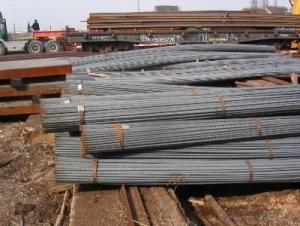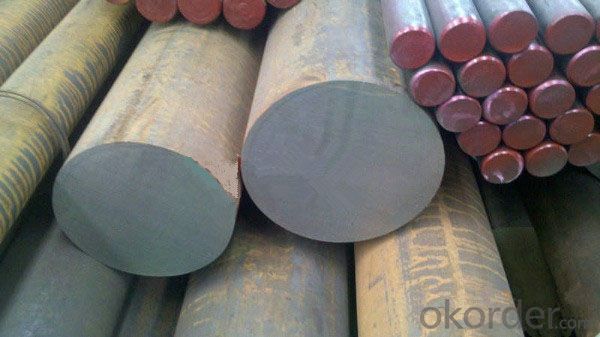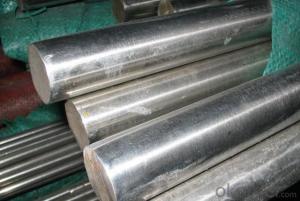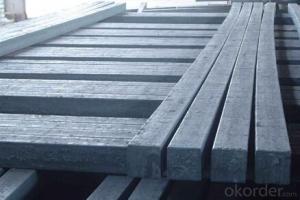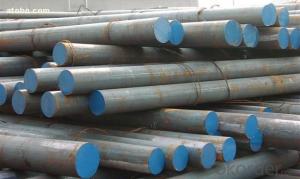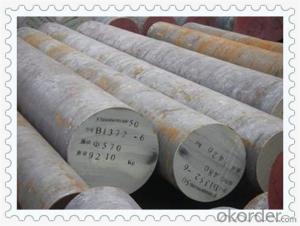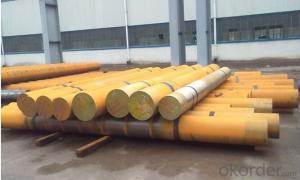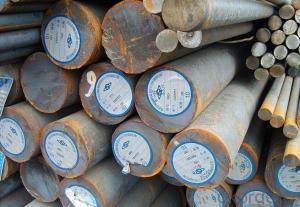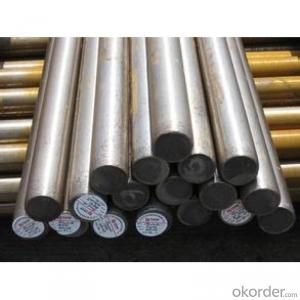H13 Round bar Special Steel Carbon Steel
- Loading Port:
- China main port
- Payment Terms:
- TT OR LC
- Min Order Qty:
- 25 m.t.
- Supply Capability:
- 10000 m.t./month
OKorder Service Pledge
OKorder Financial Service
You Might Also Like
Specification
Chemical Composition%
| Country | Standard | C | Si | Mn | Cr | Mo | V | S | P |
| China(GB) | 4Cr5NoSiV1 | 0.32-0.45 | 0.80-1.20 | 0.20-0.50 | 4.75-5.50 | 1.10-1.75 | 0.80-1.20 | ≤0.030 | ≤0.030 |
| USA(ASTM) | H13 | 0.32-0.45 | 0.80-1.20 | 0.20-0.50 | 4.75-5.50 | 1.10-1.75 | 0.80-1.20 | ≤0.030 | ≤0.030 |
| Germany(DIN) | 1.2344 | 0.37-0.42 | 0.90-1.20 | 0.30-0.50 | 4.80-5.50 | 1.20-1.50 | 0.90-1.10 | ≤0.030 | ≤0.030 |
| Japan(JIS) | SKD61 | 0.37-0.42 | 0.90-1.20 | ≤0.50 | 4.50-5.50 | 1.00-1.50 | 0.80-1.20 | ≤0.030 | ≤0.030 |
Available Size
Rolled round bar:φ12-80mm × L
Forged round bar:φ85-600mm × L
Characterstics
| 1.Higher thermal strength and hardness | ||||||
| 2.Better toughness and elevated temperature fatigue resistance | ||||||
| 3.Hardness maintaining ability at 600℃ | ||||||
| 4.Good polishing performance |
Applications: Suitable for aluminum and copper die-casting moulds working for long time at elevated temperatures,hot extrusion dies,core rod forging dies,plastic moulds,etc,also suitable for heat resistance thimbles,push rods and ejector sleeves


1, Your advantages?
professional products inquiry, products knowledge train (for agents), smooth goods delivery, excellent customer solution proposale
2, Test & Certificate?
SGS test is available, customer inspection before shipping is welcome, third party inspection is no problem
3, Payment Terms?
30% TT as deposit and 70% before delivery.
Irrevocable L/C at sight.
4, Trading Terms?
EXW, FOB, CIF, FFR, CNF
6, After-sale Service?
We provides the services and support you need for every step of our cooperation. We're the business partner you can trust.
For any problem, please kindly contact us at any your convenient time.
We'll reply you in our first priority within 24 hours.
- Q: How does special steel perform in extreme temperature conditions?
- Special steel performs exceptionally well in extreme temperature conditions. It has high resistance to thermal stress, maintaining its strength and toughness even at both extremely high and low temperatures. This makes it suitable for applications in industries such as aerospace, oil and gas, and power generation, where extreme temperatures are encountered. Special steel's ability to withstand these conditions ensures optimal performance and reliability in critical environments.
- Q: What are the common challenges in welding titanium alloys?
- Welding titanium alloys poses several common challenges, mainly due to the unique properties of titanium. First, titanium has a high melting point, around 1668°C (3034°F), which requires specialized equipment and techniques to achieve optimal welding conditions. This high melting point also increases the risk of overheating and subsequent distortion or warping of the welded parts. Another challenge is the high reactivity of titanium with oxygen, nitrogen, and hydrogen. During the welding process, these gases can easily contaminate the weld pool, leading to the formation of brittle and porous welds. Therefore, stringent measures such as using inert shielding gases like argon or helium, maintaining a high level of cleanliness, and employing proper welding techniques like gas tungsten arc welding (GTAW) are necessary to minimize contamination and achieve sound welds. Titanium also has a strong affinity for carbon, which can result in the formation of brittle intermetallic compounds during welding. To prevent this, it is crucial to use low-carbon filler metals and ensure proper heat input to avoid carbon diffusion into the weld zone. Furthermore, titanium alloys have a low thermal conductivity, which means that heat generated during welding tends to concentrate in a small area, leading to localized overheating and potential damage. Therefore, controlling heat input and employing appropriate welding techniques to distribute heat evenly are crucial to avoid overheating and maintain the integrity of the welded joint. Lastly, titanium alloys exhibit a high thermal expansion coefficient, causing significant thermal expansion and contraction during the welding process. This can result in distortion and residual stresses in the welded parts. To mitigate these issues, preheating and post-weld heat treatment may be necessary to minimize distortion and relieve residual stresses. In summary, the common challenges in welding titanium alloys include high melting point, reactivity with gases, potential contamination, formation of intermetallic compounds, low thermal conductivity, and significant thermal expansion. By understanding these challenges and implementing appropriate welding techniques, it is possible to overcome these difficulties and achieve high-quality welds in titanium alloys.
- Q: What are the advantages of using special steel in various industries?
- There are several advantages of using special steel in various industries. Firstly, special steel possesses excellent strength and durability, making it suitable for applications that require high mechanical performance and resistance to wear and tear. Secondly, special steel offers superior corrosion resistance, which is crucial in industries exposed to harsh environments or corrosive substances. Additionally, special steel can be easily manipulated and molded into different shapes, enabling manufacturers to create complex and customized components. Lastly, special steel can withstand extreme temperatures, making it ideal for industries such as aerospace and automotive that operate in demanding conditions. Overall, the advantages of special steel contribute to improved product performance, longer lifespan, and increased operational efficiency in various industries.
- Q: How does special steel contribute to the oil and gas aftermarket industry?
- Due to its unique properties and capabilities, special steel plays a vital role in the oil and gas aftermarket industry. Its resistance to corrosion makes it well-suited for use in the harsh and corrosive environments commonly found in this sector. By preventing corrosion, special steel extends the lifespan of equipment and components, reducing the need for frequent replacements and maintenance. Additionally, special steel offers high strength and durability, enabling it to withstand the extreme pressures and temperatures encountered in oil and gas operations. This strength ensures that equipment and components made from special steel can function reliably and efficiently, even under demanding conditions. Moreover, special steel can be customized to meet the specific requirements of the oil and gas industry. With its various grades and compositions, special steel can possess specific properties, such as resistance to sulfide stress cracking, hydrogen embrittlement, and high-temperature oxidation. These tailored properties make special steel suitable for critical applications, including wellheads, pipelines, valves, and other equipment used in the oil and gas aftermarket industry. Furthermore, special steel allows for the production of complex and intricate components that are essential for the oil and gas sector. Its excellent machinability and weldability enable the creation of precision-engineered parts, ensuring the efficient and reliable operation of oil and gas equipment. In conclusion, special steel plays a significant role in the oil and gas aftermarket industry by providing corrosion resistance, high strength, durability, customization options, and the ability to manufacture intricate components. These properties make special steel indispensable in ensuring the safety, reliability, and efficiency of operations in the oil and gas sector.
- Q: What is the significance of vanadium in special steel?
- Due to its unique properties and effects on the performance of steel, vanadium is an important element in special steel. Special steel, which is designed for specific applications requiring strength, durability, and specific characteristics, benefits greatly from the inclusion of vanadium. One of the primary rationales behind using vanadium in special steel is its ability to increase the steel's strength and toughness. Vanadium forms robust carbides within the microstructure of the steel, which prevent grain growth and enhance its resistance to deformation and cracking. This makes the steel highly suitable for applications that demand exceptional strength, such as the construction of bridges, high-rise buildings, and machinery. In addition to strength, vanadium also improves the hardenability of the steel. Hardenability refers to the steel's capacity to be hardened through heat treatment methods like quenching and tempering. Vanadium enhances the hardenability of the steel, enabling easy achievement of desired properties like increased wear resistance and improved cutting performance. This makes vanadium-containing special steel ideal for tools, dies, and other applications requiring hardness and wear resistance. Furthermore, vanadium contributes to the steel's resistance to corrosion. It creates stable oxide layers on the steel's surface, acting as a protective barrier against corrosion and oxidation. This is particularly advantageous in harsh environments like marine environments or chemical processing plants. Moreover, vanadium also enhances the heat resistance and thermal stability of special steel. It helps the steel retain its strength and hardness even at high temperatures, making it suitable for applications involving high-temperature environments like aerospace components and automotive engine parts. In summary, the importance of vanadium in special steel lies in its ability to enhance the steel's strength, toughness, hardenability, corrosion resistance, and heat resistance. These properties make vanadium-containing special steel highly sought after in various industries that require exceptional performance and reliability.
- Q: How is boron steel used in automotive safety applications?
- Boron steel is used in automotive safety applications due to its high strength and ability to absorb and distribute impact energy. It is commonly used in the construction of safety cages, reinforcements, and components such as side impact beams, door beams, and crash boxes. Its exceptional crashworthiness properties help improve the structural integrity of vehicles, enhance occupant protection, and reduce the risk of serious injuries during accidents.
- Q: What are the environmental benefits of using special steel?
- Special steel, such as stainless steel, offers several environmental benefits. Firstly, it is highly durable and long-lasting, reducing the need for frequent replacements and minimizing waste generation. Additionally, special steel is corrosion-resistant, which reduces the use of toxic coatings or chemicals to protect against rust and degradation. Furthermore, the production of special steel requires less energy and emits fewer greenhouse gases compared to other materials like aluminum or plastic. Finally, special steel is recyclable, allowing for a closed-loop system where it can be repurposed and reused, further reducing the environmental impact. Overall, the use of special steel contributes to sustainability by conserving resources, reducing pollution, and promoting circular economy practices.
- Q: How does bearing steel contribute to the manufacturing of bearings?
- Bearing steel is a crucial material in the manufacturing of bearings as it provides the necessary strength, durability, and wear resistance required for the efficient operation of bearings. The high carbon content in bearing steel enhances its hardness and strength, ensuring that the bearings can withstand heavy loads, high speeds, and extreme operating conditions. Additionally, the unique composition and heat treatment of bearing steel enable it to maintain dimensional stability and minimize friction, leading to improved performance and longer life of the bearings.
- Q: What are the different methods of hardening special steel?
- There are several methods of hardening special steel, each with its own advantages and applications. 1. Quenching: This is a common method used to harden steel. It involves heating the steel to a critical temperature and then rapidly cooling it by immersing it in a quenching medium such as oil, water, or air. This rapid cooling causes the formation of a martensitic structure, which is harder and more brittle than the original steel. 2. Tempering: After quenching, the steel is often tempered to reduce brittleness and improve toughness. Tempering involves reheating the hardened steel to a specific temperature and holding it at that temperature for a predetermined amount of time. This process helps to reduce internal stresses and improve the overall mechanical properties of the steel. 3. Case hardening: This method is used to increase the hardness of the outer layer of steel while maintaining a tough and ductile core. Case hardening involves introducing carbon or nitrogen into the surface of the steel through processes like carburizing or nitriding. This creates a hard surface layer while maintaining the desired properties in the core. 4. Induction hardening: This technique is commonly used for specific areas of a component that require localized hardening. It involves using an electromagnetic field to heat only a specific region of the steel, followed by rapid quenching. Induction hardening provides precise control over the hardened area while maintaining the desired properties in the rest of the component. 5. Cryogenic treatment: This method involves subjecting the hardened steel to extremely low temperatures, often below -150°C (-238°F). This process helps to further refine the microstructure of the steel, improving its hardness, wear resistance, and dimensional stability. 6. Flame hardening: This method involves heating the surface of the steel using a high-temperature flame and then quenching it. Flame hardening is commonly used for large components or areas that require localized hardening. It is important to choose the appropriate method based on the specific requirements of the steel and the intended application. The selection of the method depends on factors such as the desired hardness, toughness, wear resistance, and dimensional stability of the steel.
- Q: What are the different methods of improving the toughness of special steel?
- To enhance the toughness of special steel, various techniques can be utilized. One effective method involves the addition of alloying elements such as nickel, chromium, or manganese to the steel composition. These elements contribute to increased strength and resistance to cracking or fracturing. Another approach is to apply heat treatment processes like quenching and tempering. Quenching rapidly cools the steel from a high temperature, resulting in a hardened structure. On the other hand, tempering involves reheating the quenched steel to a specific temperature and then slowly cooling it. In addition, grain refinement techniques can be employed to improve toughness. Controlling the size and distribution of grains within the steel enhances its resistance to fracture. Methods like grain size control through recrystallization and severe plastic deformation can be used to refine the grain structure. Furthermore, maintaining low impurity content in the steel is crucial for its toughness. Impurities like sulfur and phosphorus can cause brittleness, so refining and purification processes should be employed to reduce their presence. Moreover, surface treatment methods such as shot peening or surface hardening can be implemented. Shot peening involves bombarding the steel surface with small spherical particles to induce compressive stress, which helps in resisting crack propagation. Surface hardening techniques like carburizing or nitriding create a hardened layer on the surface, enhancing toughness. In conclusion, improving the toughness of special steel can be achieved through alloying, heat treatment, grain refinement, impurity control, and surface treatment. These techniques can be used individually or in combination to enhance the steel's properties and make it more resistant to cracking or fracturing.
Send your message to us
H13 Round bar Special Steel Carbon Steel
- Loading Port:
- China main port
- Payment Terms:
- TT OR LC
- Min Order Qty:
- 25 m.t.
- Supply Capability:
- 10000 m.t./month
OKorder Service Pledge
OKorder Financial Service
Similar products
Hot products
Hot Searches
Related keywords
